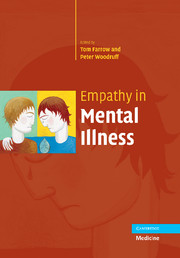Book contents
- Frontmatter
- Contents
- Foreword
- List of contributors
- Part I ‘Dysempathy’ in psychiatric samples
- Part II Empathy and related concepts in health
- 9 Neonatal antecedents for empathy
- 10 The evolutionary neurobiology, emergence and facilitation of empathy
- 11 Naturally occurring variability in state empathy
- 12 Neuroimaging of empathy
- 13 The neurophysiology of empathy
- 14 The cognitive neuropsychology of empathy
- 15 The genetics of empathy and its disorders
- 16 Empathogenic agents: their use, abuse, mechanism of action and addiction potential
- 17 Existential empathy: the intimacy of self and other
- 18 Empathizing and systemizing in males, females and autism: a test of the neural competition theory
- 19 Motivational-affective processing and the neural foundations of empathy
- 20 Face processing and empathy
- Part III Empathy models, regulation and measurement of empathy
- Index
18 - Empathizing and systemizing in males, females and autism: a test of the neural competition theory
from Part II - Empathy and related concepts in health
Published online by Cambridge University Press: 17 August 2009
- Frontmatter
- Contents
- Foreword
- List of contributors
- Part I ‘Dysempathy’ in psychiatric samples
- Part II Empathy and related concepts in health
- 9 Neonatal antecedents for empathy
- 10 The evolutionary neurobiology, emergence and facilitation of empathy
- 11 Naturally occurring variability in state empathy
- 12 Neuroimaging of empathy
- 13 The neurophysiology of empathy
- 14 The cognitive neuropsychology of empathy
- 15 The genetics of empathy and its disorders
- 16 Empathogenic agents: their use, abuse, mechanism of action and addiction potential
- 17 Existential empathy: the intimacy of self and other
- 18 Empathizing and systemizing in males, females and autism: a test of the neural competition theory
- 19 Motivational-affective processing and the neural foundations of empathy
- 20 Face processing and empathy
- Part III Empathy models, regulation and measurement of empathy
- Index
Summary
Empathizing and systemizing: sex differences
Two key modes of thought are systemizing and empathizing (Baron-Cohen, 2002). Systemizing is the drive to understand the rules governing the behaviour of a system and the drive to construct systems that are lawful. Systemizing allows one to predict and control such systems. Empathizing is the drive to identify another person's thoughts or emotions, and to respond to their mental states with an appropriate emotion. Empathizing allows one to predict another person's behaviour at a level that is accurate enough to facilitate social interaction. A growing body of data suggests that, on average, females are better than males at empathizing, and males are better than females at systemizing (Geary, 1998; Maccoby, 1999). In this chapter, we review evidence that these abilities strongly differentiate the male and female brain types, and re-analyse some published data to show that these abilities compete, so that despite sex differences in cognitive style, there is no overall sex difference in cognitive ability.
Autism
Individuals with autism spectrum conditions have severe social difficulties and an ‘obsessional’ pattern of thought and behaviour (American Psychiatric Association, 1994). Such diagnostic features may arise as a result of their significant disabilities in empathizing (Baron-Cohen et al., 1999, 2001a; Baron-Cohen and Wheelwright, 2003) as well as their stronger drive to systemize (Baron-Cohen et al., 2001b; Jolliffe & Baron-Cohen, 1997).
- Type
- Chapter
- Information
- Empathy in Mental Illness , pp. 322 - 334Publisher: Cambridge University PressPrint publication year: 2007
- 3
- Cited by



